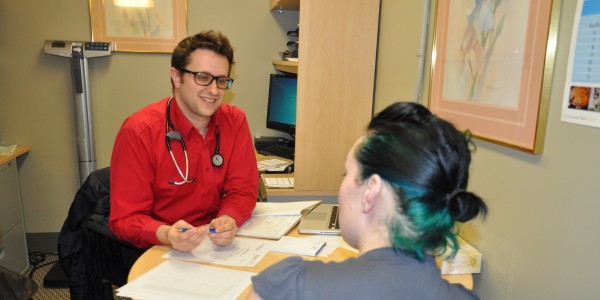Diabetes and our community
It’s a looming health crisis. A disease you can live with because it starts off with minimal to no symptoms. But silently, it progresses until it gets worse and then you experience your first heart attack or your first stroke. Or blindness. Or kidney failure.
Diabetes is a chronic disease and it’s growing at an alarming pace. In 20 years, diabetes will be one of our biggest health care burdens as it grows to become the number one killer on the planet.
Dr. David E. Harris is an endocrinology and metabolism specialist with a primary focus on diabetes and obesity. He’s made it his mission to champion a new era of diabetes care here, overseeing Richmond Hospital’s largest chronic disease clinic. His patients come from across Richmond, south Vancouver, North Surrey and Delta with care and services provided in English, Mandarin and Cantonese.
He’s also addressing diabetes with his team of researchers, conducting research funded, in par, by donors in our community. Interestingly, Richmond’s rich diversity provides us with a unique opportunity to acquire knowledge right here at home, to help our local population.
In Dr. Harris’ own words
“Richmond is still noted as the healthiest city in Canada for its diabetes rate, which is interesting because a lot of people have suggested that that’s because of the immigrant population in our city, who tend to have healthy habits when they arrive. Even though our track record is good, things are progressing in the wrong direction.
Richmond’s rate of increase for diabetes is one of the highest in Canada, which is only surpassed only by First Nations communities and remote communities. At this rate, we will catch up with Alberta and Ontario in the next five to 10 years.
A lot of the Chinese population we have in Richmond who had immigrated 20 to 30 years ago are getting diabetes. It’s a bit of ticking time bomb. Chinese people may be carrying a genetic risk that we need to address.
What we’ve observed is that the Chinese population is not overly obese compared to other ethnicities, but they are still getting diabetes.There is new thinking that our Chinese population is getting diabetes with a normal body weight. And when people adopt aWestern diet, it appears even faster.The insulin reserve in their body is depleted much quicker than normal.
The Chinese population is not acquiring diabetes in the traditional ways that Caucasian, Black or Hispanic populations do. Because of that, we’re learning to treat patients differently. Sometimes that means we need to use different medications than we would use for a patient who’s Caucasian in the beginning of therapy.
Research is important because we’re trying to prevent disease before it happens. If we address it early enough, we can prevent things from occurring that kill people, such as heart attacks, strokes, infections…I can’t tell you how life-changing it is when someone loses their eyesight.We want to prevent that tragedy.
So, we are undertaking a number of research studies right here in Richmond. One is a dietary study for the Chinese population.We had a lot of people asking for strategies to allow them to eat traditional foods in a healthy manner, and we are providing culturally appropriate Cantonese and Mandarin cooking classes in a research setting to help them control their diabetes.
Often it’s challenging to get patients to enroll in research studies. But it’s crucial that we do. We’re expanding the knowledge for the health care of the Chinese population. We have to learn how best to treat our citizens. Research allows us to do that and we’re grateful to donors for helping us expand this knowledge.
This will mean we can incorporate our findings into the care and treatments we provide our patients. We want to change the future.”

